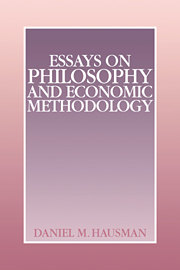Book contents
- Frontmatter
- Contents
- Introduction: What is philosophy of economics?
- PART I METHODOLOGY AND THEORY APPRAISAL
- 1 Economic methodology in a nutshell
- 2 On the conceptual structure of neoclassical economics – a philosopher's view
- 3 John Stuart Mill's philosophy of economics
- 4 The deductive method
- 5 Why look under the hood?
- 6 An appraisal of Popperian methodology
- 7 Is falsificationism unpractised or unpractisable?
- 8 The limits of economic science
- PART II CAUSALITY IN ECONOMICS
- PART III CASES AND PUZZLES
- PART IV POSTSCRIPTS
- Bibliography of relevant writings by Daniel M. Hausman
- Bibliography of works by other authors
- Index
7 - Is falsificationism unpractised or unpractisable?
Published online by Cambridge University Press: 05 June 2012
- Frontmatter
- Contents
- Introduction: What is philosophy of economics?
- PART I METHODOLOGY AND THEORY APPRAISAL
- 1 Economic methodology in a nutshell
- 2 On the conceptual structure of neoclassical economics – a philosopher's view
- 3 John Stuart Mill's philosophy of economics
- 4 The deductive method
- 5 Why look under the hood?
- 6 An appraisal of Popperian methodology
- 7 Is falsificationism unpractised or unpractisable?
- 8 The limits of economic science
- PART II CAUSALITY IN ECONOMICS
- PART III CASES AND PUZZLES
- PART IV POSTSCRIPTS
- Bibliography of relevant writings by Daniel M. Hausman
- Bibliography of works by other authors
- Index
Summary
Bruce Caldwell has recently argued that falsificationism is just too hard to practice in economics. He takes falsificationism to demand that theories be put to tests which are such that if the results are unfavorable, the theory under test must be given up or substantially modified. But it would obviously be silly to permit the results of any test, no matter how faulty it might be, to lead to such a drastic action. Thus,
… for falsificationism to be viable, straightforward empirical tests must be possible. This requires that general laws be present; that initial conditions be relatively few in number, known, not subject to change, and easily checkable, that a test be a test of a theory, not a model; that data be trustworthy, complete, and accurately representative of analogous constructs in the theory. It is now perhaps understandable why falsificationism, though dominant in the methodological literature, seems to have been little practiced by working economists.
(1984, p. 494)Indeed, but if falsificationism really demands all this, it is not understandable why falsificationism is dominant in the methodological literature nor why anybody would stop to consider such an implausible doctrine. For remember that falsifiability is not supposed to be merely some nice trait of theories such as linearity or avoidance of imaginary numbers. In Popper's view falsifiability is the mark of science. And whether something is science or not is not a mere taxonomic question, but a question of whether the claims are genuinely empirically supported or corroborated or not.
Information
- Type
- Chapter
- Information
- Essays on Philosophy and Economic Methodology , pp. 92 - 98Publisher: Cambridge University PressPrint publication year: 1992
